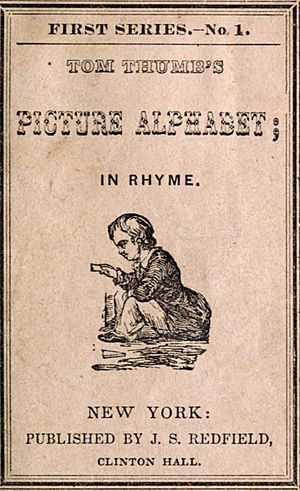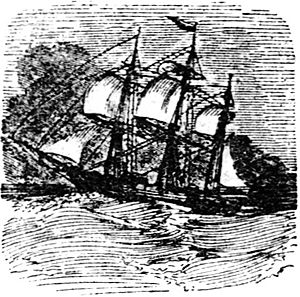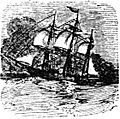Tom Thumb's Picture Alphabet facts for kids

Cover of the c. 1850 publication.
|
|
| Illustrator | J. G. Chapman |
|---|---|
| Country | United States |
| Language | English |
| Genre | Children's literature |
| Publisher | J. S. Redfield |
| Media type | Print (chapbook) |
| Pages | 7 pp |
| OCLC | 21722065 |
| Text | Tom Thumb's Picture Alphabet at Wikisource |
Tom Thumb's Picture Alphabet is an old picture book made for children. It was first published in the 1850s. This book helped kids learn their English alphabet using fun rhymes and pictures.
About the Book
Tom Thumb's Picture Alphabet was published in New York around the 1850s. It is a type of book called a chapbook. A chapbook is a small, inexpensive book that was popular a long time ago.
This book was part of a larger collection called "Redfield's Toy Books." It was the very first book in this series. There were 48 children's books in total in this collection.
What Made It Special?
The book was quite affordable, costing only 1 cent when it was new. It had simple pictures called woodcut engravings, created by J. G. Chapman. The book itself was very small, only about 9 centimeters (3.5 inches) tall.
It had seven pages filled with rhyming words for each letter of the alphabet. For example, for the letter "S," there was a picture of a ship.
A Book for Learning
Tom Thumb's Picture Alphabet was seen as a schoolbook during a time when many new educational books were being made for children. It was even considered part of the "New England Primer" tradition. The New England Primer was a very important textbook used by children in early America.
Some people thought the book was good because it had a clear sentence for each letter. However, others felt that some words used in the rhymes might have been too hard for young children to understand.
Later Versions
Because it was popular, Tom Thumb's Picture Alphabet has been printed again many times. Different publishers, like Kiggins and Kellogg, made their own versions.
In 2002, a company called Scholastic released a new version. This newer book, which appeared in a collection called Treasury Of Alphabets, had fresh illustrations by an artist named Tiphanie Beeke.
Images for kids




